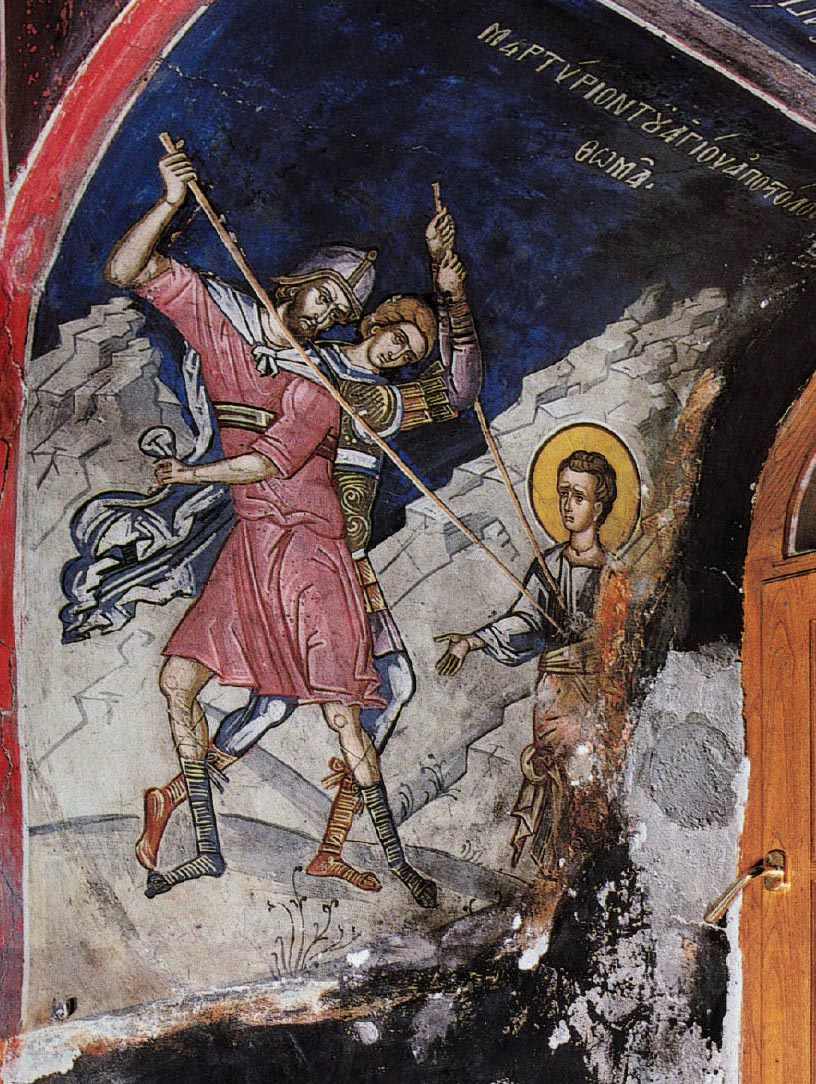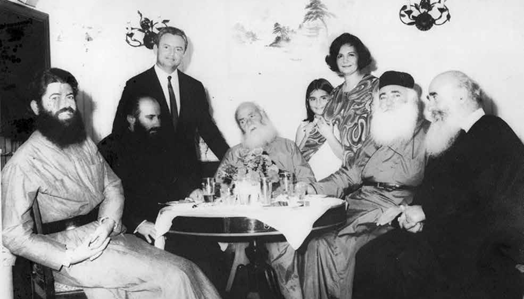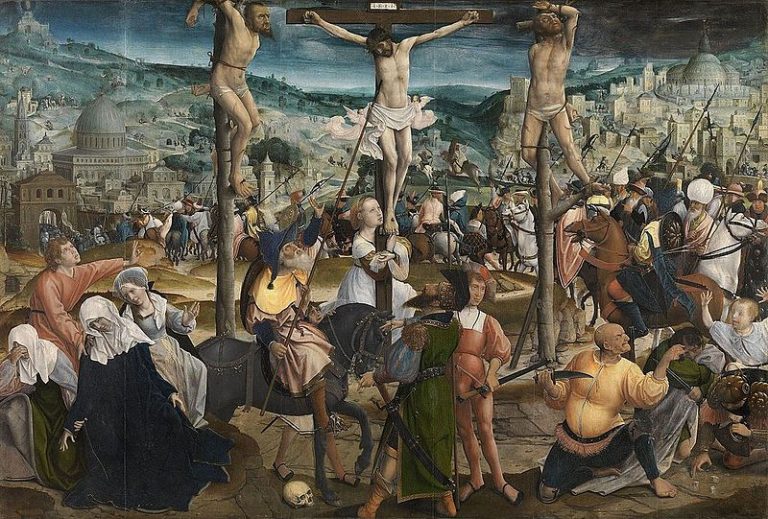From fear and distrust, to charity and mission to the end!
Apostle Thomas came from a family of fishermen. Most probably – according to Church tradition – he practiced the profession of a carpenter or a builder. The evangelist John mentions him among the disciples who accompanied Peter fishing (John 21:2-3), although this does not necessarily imply that the Apostle in question was also professionally involved in fishing. In the New Testament, we get a sense of Thomas’ personality when the Lord learns of his friend Lazarus’ illness and expresses a desire to visit him in Judea, overlooking the faint-heartedness of the disciples, who anxiously ask, “Rabbi, do the Jews now seek thee, and dost thou go thither again?” (Jn 11:8). Then the frightened – as St Chrysostom describes him – Thomas exclaims: “let us fight and die with him” (Jn 11:16). This pessimistic phrase is an embodiment of the pressure experienced by the disciple, who loves the Master but is “spiritually weaker than the others and unfaithful” (John Chrysostom, Sermon XB, H.P.E., ed. “Gregory Palamas”, vol. 14, Thessaloniki 1981, p. 181). Yet, despite all his weakness of faith and his cowardice, he followed Jesus, trusted Him, stayed with Him, his own. And one ponders… I wonder who is more praiseworthy? The coward who resists his fear and goes along, or the brave one who finally refuses? Then follow the events through which the Lord gradually prepares His disciples for His saving sufferings.
- Mary anoints Jesus’ feet, with Judas protesting and the Lord justifying her action with a shocking reply, “Seeing her, on the day of my burial I have done this” (John 12:7).
- Jesus then enters Jerusalem, fulfilling the prophecy , “Behold, your king is coming, sitting on a throne of wine” (John 12:15), but at the same time disappointing His disciples, who were expecting a worldly king with earthly glory.
- Then he washes the feet of the twelve, teaching them humility.
- It reveals the traitor.
- He gives the new commandment that from then on marks the identity of every Christian – “love one another” (John 13:34).
- Then, on the occasion of Peter’s confident speech “I will give you my soul for your sake”, he anticipates his refusal, wanting to give everyone a great lesson, as interpreted by St Chrysostom: “What do you say, Peter? Did the Lord say ‘you cannot’ and you claim ‘I can’? Well you will know by this trial that your love is of no value if there is no heavenly support… leave him alone, so that he may realize his weakness” (John Chrysostom, Homily XB, H.P.E., ed. “Gregory Palamas”, vol. 14, Thessaloniki 1981, pp. 396-397).
- Finally, in an attempt to initiate them into His plan of divine economy, Jesus reveals His destination, which – He explains – is also their destination.
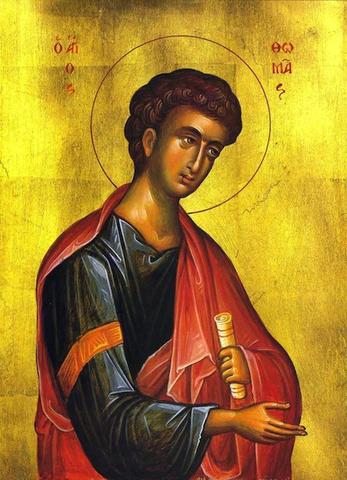
At this point we hear Thomas asking in wonder, “Lord, we have not seen where you are going, and how can we see the way?” (Jn 14:5) Then Jesus seizes the opportunity and delivers one of the most important lessons that carries the weight of revelation: “I am the way, and the truth, and the life: let not any man come to the Father, except through me” (Jn 14:6). Interpreting Christ’s reply, St. John notes: “I am the way”; this is proof of “no one comes but through me” and “and truth and life”, that these things will certainly come to pass. Therefore, since I am and the life, not even this death will be able to prevent you from coming. Moreover, if ‘I am the way’ you will not need a guide, and if I am also the truth, my words are not a lie, and if I am also life, and even if you die, you will achieve what has been said” (John Chrysostom, Sermon XB, H.P.E, Gregory Palamas, vol. 14, Thessaloniki 1981, p. 405). The inspired text presents for the last time the Apostle Thomas in one of the appearances of the Risen Christ. The God-Man has so economized the situation that Thomas is absent in His first meeting with the disciples after the Resurrection. When the absent one is informed of the shocking event, he disbelieves, saying: “Except I see in his hands the type of the others, and put my finger into the type of the others, and put my hand into his side, I will not believe” (Jn 20:25). The Lord, therefore, after eight days, hastens and reappears to the disciples, when Thomas was in their midst. The Omniscient One personally addresses him and exhorts him: “Bring thine finger, O thou, and see my hands, and bring thy hand, and lay it by my side, and be not an unbeliever, but a believer” (Jn 20:27); “But thou, when thou seest the disciple that believeth not, consider the charity of the Lord, how that even the grace of one soul showeth itself wounded, and cometh to save the one also, though he were spiritually more imperfect than others. Therefore he asks to believe by the grossest sense, and he did not believe with his eyes either, for he did not say, ‘if I do not see,’ but ‘if I do not feel,’ he says, ‘lest what I see should be a ghost.’ And yet the disciples who announced these things were trustworthy, and the Lord himself who promised these things, but because he asked for something more, Christ did not withhold even this from him” (John Chrysostom, Sermon XB, H.P.E., ed. “Gregory Palamas”, vol. 14, Thessaloniki 1981, pp. 719-721). Thomas… the man of our time; the sceptical, the suspicious, the often deceived, the one who, if he does not experience, if he does not know, if he does not see examples, practical love, virtues in the people who preach to him, who teach him, if he does not smell holiness, “thou shalt not” believe… In addressing such people with the saving work of missionary work, the Church, too, must follow the example of its head, Jesus. It needs to reveal itself where it has not done so, to reappear where it has already appeared… and, when this happens, to have to show eyes tearful from sympathy for human suffering, hands bloody from the toil of charity, body wounded by the toil of the arduous journey in Christ, side opened by the pain of sacrifice and a firm, resurrected mind…
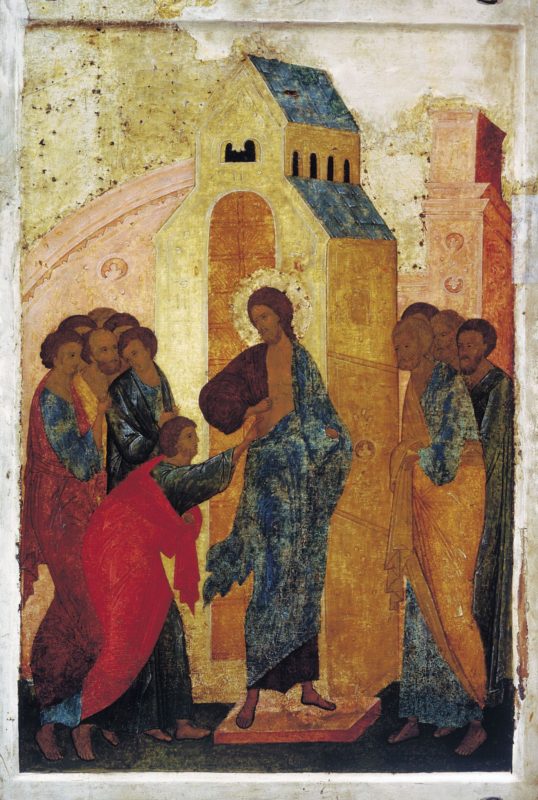
Resurrection, Ascension, Pentecost… and the spirit-bearing apostles scattered to the ends of the earth, hungry in the “Ye have walked, ye have always made disciples of the nations”. Such a course was followed by our Saint, Apostle Thomas. The Holy Spirit led his intercessions to the Parthians, the Medes, the Persians (Nicodemus of Mount Athos, Synaxaristis, ed. “Orthodox Kypseli”, vol. 1, Thessaloniki 2003, p. 296) and especially the Indians, as his apolyticus melodically commemorates: “Wherefore of godliness, thou hast suppressed the word, and lightened in India, as the ray of heaven, the divine glory of the Apostles.”. There, as Saint Nicodemus the Athonite informs us, the Apostle of God catechized and baptized the son of the King of India, Mishdaeus, as well as his wife and his two daughters. When the King became aware of this, he ordered his arrest and death by the martyrdom of plague. A remarkable and yet instructive incident is preserved by the biographers of St. Thomas; an incident which urges the proper use of money for the purpose, not of earthly glory and satisfaction, but of investment in heaven, as vividly found in Proverbs: “He lendeth Thee the merciful to the poor” (Prov. 19:17). Another Indian king, Woody, asked the Apostle of God, being the craftsman he was, to build him a beautiful palace the like of which would not be found on earth. He did not spare the money; on the contrary, he promised him more than he needed. In fact, because it was necessary for him to make a long journey at that time, he pointed out the place, offered him much gold, promised him more, and departed. So the Saint began his work; he slowly offered all the gold to the poor, orphans and helpless, building for the king, not an earthly perishable palace, but a heavenly one. He even asked for more money. He distributed that too, increasing the royal deposits in the bank of heaven. And the Apostle Thomas preached and gave alms! And he was spreading the Gospel and doing charity, with the direct result of the Word of God growing in the hearts of the Hindus and enlightening their minds. When the king was informed of what was happening, he returned home in a rage. He asked Thomas to lead him to the palace he had been financing for so long, and he calmly replied that he would see that in eternal life… Then, Woody got even more angry and ordered Thomas to be arrested and taken to prison. But a miraculous event happened to the king’s brother that confirmed Thomas’ words. The king turned a blind eye, released the Apostle, apologized to him and then, after being indoctrinated, he was baptized (Nicodemus Agionritos, Synaxaristis, “Orthodox Kypseli”, vol. 1, Thessaloniki 2003, pp. 300-303). He finally allowed the Apostle of God to continue on his way…
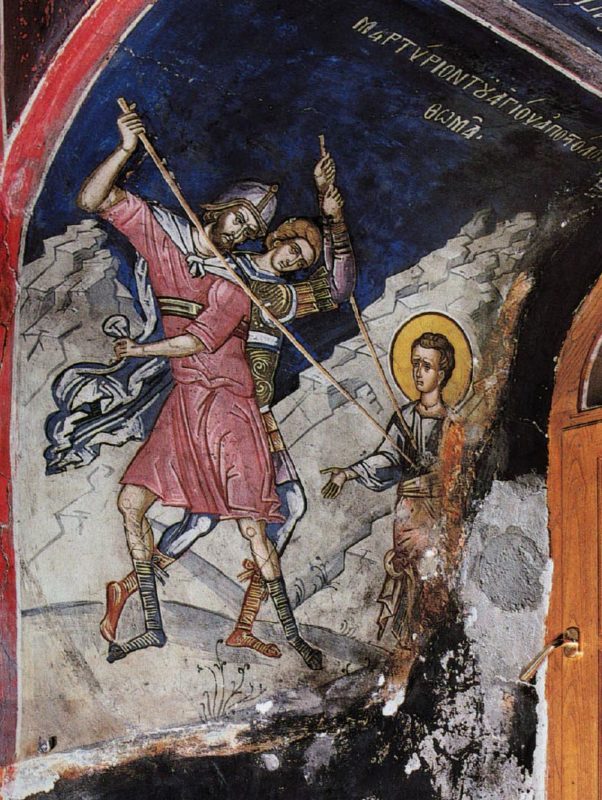
Taking our cue from the above incident, we quote below some quotes from the enlightened saint Archbishop John of Constantinople regarding money, which has the power – depending on how it is used – either to ensure eternal life or to close the gates of Paradise forever. The holy father teaches that if we love God and our fellow human beings above money, we will not be hurt by the sufferings of this life
“because we’ll think we don’t even see them. For such is the power of love, that is, those who are not near us, but are absent and we long for them, we think of them every day, because the tyranny of love is great, it sets aside everything and binds the soul to that which we long for. If we thus love Christ, all things of life here will seem a shadow, all things are a shadow, all things are a shadow and a dream. We too will say, “Who shall separate us from the love of Christ? Sadness or sorrow?” He did not say money or wealth or beauty, but he mentioned those things that seem heavy, famines, persecutions, deaths” (John Chrysostom, Sermon XB, H.P.E., ed. “Gregory Palamas”, vol. 14, Thessaloniki 1981, p. 733).
How the Lord, the Apostles, Paul, and the saints despised money! While we, because of them, are turning away from our light, our Christ. Seeing this deformity of “Christians” – in name only – the Saint comments:
“This is the terrible thing; when we see such attitudes in other people we are horrified, but when we do it ourselves, we are not horrified, but we are easily angered and we swear and take the interest, we demand and neglect prudence and turn away from real prayer and break most of the commandments and because of the money we show total indifference to our own members. For he who loves money will do infinite evil to his neighbour, and with him to himself. For he will easily become angry, and will revile him, and call him a fool, and will swear and swear, and will not keep the measure of the old law, for he who loves gold will not love his neighbour. And yet we are commanded to love our enemies also for the sake of the kingdom of heaven. For if we were to do the old commandments we could not enter the kingdom of heaven. He who loves money will not only not ignore his enemies, but will treat his friends as enemies” (John Chrysostom, Sermon XB, H.P.E., ed. “Gregory Palamas”, vol. 14, Thessaloniki 1981, pp. 733-735).
He concludes by saying:
“He who loves money will never be able to use it, but will be a slave and a keeper, and not a master, for he will always take care to make more of it, will not want to spend it for any purpose, will destroy himself and make himself poorer than all the poor, since he will by no means stop this desire…”
The memory of St. Thomas the Apostle is commemorated on the next Sunday after Resurrection Sunday and on October 6 of each year.
Apolytikon
Sound d’. Tachy bias. As a divine Apostle, the theological chimneys, thou didst inwardly expound, from the log side, Christ our God. Thou hast, therefore, of piety, having suppressed the word, lightened in India, like a ray of heaven, the divine glory of the Apostles’ God.

